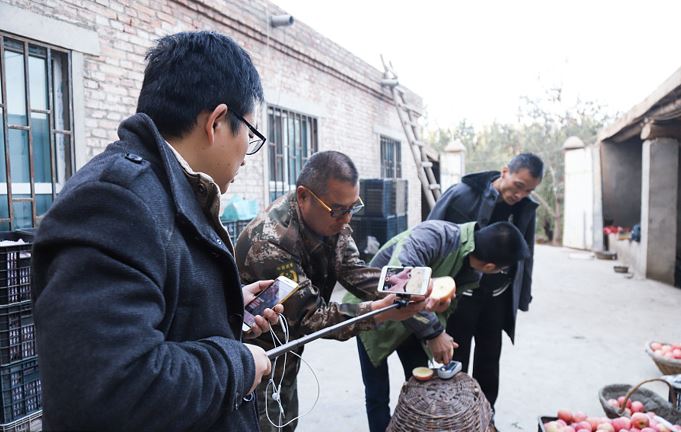
From the People's Daily app.
And this is Story in the Story.
The Chinese government's investment in roads, water projects, logistics, and Internet facilities in rural areas has enabled the rise of e-commerce entrepreneurs seizing new opportunities throughout the country.
The central government recently called for increased efforts promoting supply-side structural reform in the agricultural sector, to achieve food security while building a modern and efficient industry.
By the end of 2017, rural e-commerce had created more than 1.3 million new jobs, with total transactions for the year hitting almost $18 billion dollars.
Since last summer, 97 percent of China's villages have access to broadband Internet, and 95 percent have access to 4G networks, according to a report on China's Internet development.
By connecting farmers directly with the market via e-commerce platforms, targeted projects have fueled the booming local agricultural industries.
Today's Story in the Story looks at how China's rural villages are connecting to the modern marketplace as the country continues to increase its efforts on alleviating poverty.
Delivery staff are working at a Rural Taobao branch in Anhui Province, east China on Nov. 4, 2015. (Photo: VCG)
Gan Youqin, an orchard owner, wears a T-shirt with over-sleeves covering her tanned arms, her hair tied into a ponytail with faded highlights at the tips.
Gan looks ready to toil, but in fact, her field is online, where she has more than 8 million followers on social media.
She runs a family orchard in Lingshan County, Guangxi Zhuang Autonomous Region, the home of the Chinese lychee.
As lychee season ends, Gan's family are busy packing and dispatching dried lychees, while Gan types quickly on her cellphone, receiving orders and interacting with her followers.
Gan has a team in her orchard producing short videos about her country life, documenting her daily activities such as picking fruit, catching fish, pickling cucumbers and cooking for gatherings.
The videos are uploaded to her social media account Ingenious Ninth Sister, a name inspired by a country girl called the ninth sister depicted in a famous Chinese folk song from the 1990s.
In recent years, the online short video industry has developed rapidly in China.
"Back then many short video apps became popular, so we decided to have a try," said Zhang Yangcheng, Gan's nephew and a member of her short video team.
Zhang worked for media companies in cities but returned to his hometown Lingshan last year and asked his aunt to star in short videos featuring country life.
At first, Gan was not confident or comfortable in front of the camera, sometimes even trying to turn away.
The other villagers did not understand. "As most of us speak the local dialect here, people think we are pretentious speaking in Mandarin when shooting the videos," Zhang said.

A man sells apples through livestreaming in Northwest China's Xinjiang Uygur autonomous region on Oct 24, 2017. (Photo: VCG)
As Gan's fame grew, however, she became more confident, acting more naturally before the camera, and more followers started asking to buy the fruit shown in the videos.
"It never occurred to us that the short videos could help us sell fruit. We just wanted to show our country life," Gan said.
Lingshan County abounds with fruit, including oranges, longan, and granadilla. At the end of last year, Gan's team also helped fellow villagers promote their oranges through her account.
Gan's team estimated that they could help villagers sell more than 5 metric tons of fruit online, but they sold more than 50 tons.
In the first half of 2018, the team sold more than 1,500 tons of fruit, earning almost $3 million for herself and the villagers.
Many young people in the village became online followers, and the elderly stopped questioning their work.
The total annual lychee yield in the county reached 165,000 tons, and 12,300 tons were sold online, with about 350 tons sold through Gan's social media account.
Gan and her husband used to be migrant workers in South China's Guangdong Province but decided to return home to grow fruit in 2008.
"We may earn less, but family matters the most," she said. In the past, they returned home around four times a year. Each time, their 5-year-old son, who was left with his grandparents, was reluctant for them to go.
“With developing rural e-commerce, more young migrant workers can come home and reunite with their families," Zhang said.
(Produced by Nancy Yan Xu, Lance Crayon, Brian Lowe, and Chelle Wenqian Zeng. Music by: bensound.com. Text from China Daily.)


